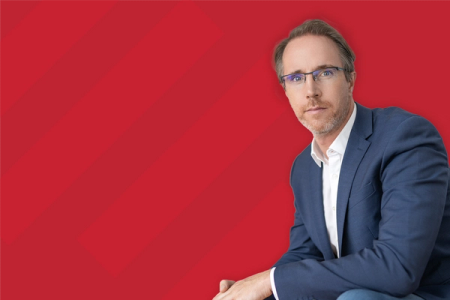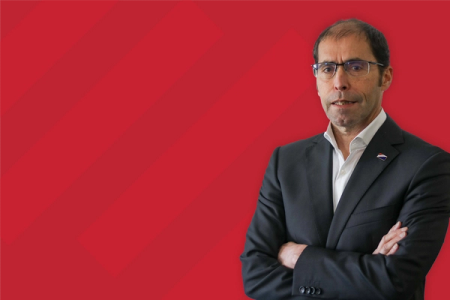You’ll learn...
- How To Start Generating Business and Winning Projects as a New MD or Partner
- How To Put Yourself Out There and Expand Your Network
- How To Make Your Business Less Dependent on You
- Marco’s Final Tips for MD and Partners Tasked With Growing New Lines of Business
Read time: 6 minutes
Marco Lichtfous is an expert in joining consultancies and building up new business lines or regions.
He has successfully built new business lines or regions for companies such as Deloitte and KPMG, and now he's doing it again, for the third time, at PMP Strategy.
In this article, we break down the learnings Marco shared during his interview on the LEADERS IN CONSULTING Podcast, covering topics like how to develop new lines of business, how to put yourself out there and grow your network, the power of providing value for free, the importance of building credibility and establishing relationships for winning clients, and more.
Let’s dive in.
How To Start Generating Business as a New MD or Partner
Developing business in new regions is an intimidating task for even the most seasoned consultant.
Fortunately, once you’ve done it a few times, as Marco Lichtfous has done, the challenge transforms into a rather simple one.
"It's a simple business. It's a people business. You have to trust people, and you have to get to know people." - Marco Lichtfous, Managing Director at PMP Strategy
And so, in the end, you’re left with a couple of straightforward questions:
a) How can I meet potential clients?
b) How can I get them to trust me?
Marco proposes the following:
- Build Trust with New Organizations: regardless of your reputation, no business will trust you with a large project once you start at a new firm. Start small and establish trust gradually.
- Engage with Your Network: Spread the word about your expertise. Arrange face-to-face meetings, such as lunches or office visits, to share your new role and the company's capabilities. You probably won’t land a project immediately, but this is a necessary first step to ensure a potential client thinks of you when they have a problem.
- Bridge International Gaps: If your firm has already built strong relationships with clients in other regions, take advantage of this relationship. Marco recommends simple tactics like asking contacts in one country to introduce counterparts in another.
- Utilize Senior Advisors: PMP Strategy leverages their network of retired senior consultants to open doors to new clients. These advisors, often highly connected retired professionals or those between jobs, can provide valuable introductions.
Following these simple steps will get you off the starting block when starting as an MD or Partner at a new firm.
Why It’s All About Building Trust
Building client trust is the cornerstone of success in consulting. Without trust, you’ll fail to win any projects, let alone build strong, long-lasting relationships with clients.
Marco, highlighted the importance of building trust during his interview:
"Where does the business come from? It comes from building trust with the client. It comes from working with the clients, and them buying into you and seeing that you're adding value. They know they can discuss their problems with you, and that you understand them." - Marco Lichtfous, Managing Director at PMP Strategy
How To Put Yourself Out There and Expand Your Network
So you’ve reached out to your existing network, maybe landed a few mini projects, and you’ve started to build trust with a some great clients.
The challenge now becomes: How can you continue growing your network to win more projects?
Well, the interesting thing about consulting is it’s more about the individual than it is about the company, so if you want to start winning business in your new venture, you’re going to need to develop your personal brand.
Essentially, you need to make potential clients think of you when they have a problem.
Here’s how to do it:
- Build Your Presence In The Community: Publish white papers, attend networking events, and speak at conferences to establish yourself as a thought-leader. Be patient. Marco recalls a client reaching out two years after reading his white paper, leading to a significant business relationship.
- Be Proactive at Events: Active participation in conferences is key. Marco advises not just attending, but engaging with attendees, sharing insights, and collecting contacts. Follow up with connections you made after the conference.
- Spray and Pray: This is a controversial one, but it works for some. While cold calling and buying lists are options, Marco cautions against over-reliance on these methods due to their potential to harm one's professional image.
Notice how publishing a free online resource like a white paper led to a significant, long-term partnership two years down the road.
Let’s look a little closer at this idea of offering value for free.
The Power of Providing Value for FREE
Charging your potential clients for valuable resources could be ruining your chances of winning them as clients in the future.
Here are some of the benefits of providing value to your target group free of charge:
- Offering free advice and resources builds trust and positions you as a knowledgeable and helpful industry leader.
- Giving away valuable insights might not yield immediate business, but it often leads to long-term relationships.
- Offering value demonstrates an understanding of clients' needs and challenges.
- Clients often attempt to implement strategies on their own, but return for expert help when they face challenges.
So next time you consider putting up a paywall or charging for a webinar, consider the real cost of excluding some of your audience.
How To Make the Business Less Dependent on You
While expanding your networking, building trust, and winning clients are all essential parts of being a high-performing MD or Partner, it would be a mistake to build a business that relies exclusively on you or a handful of key players to keep the business running.
Traditional consultancies have operated on this model for a long time, but modern consulting has highlighted the pitfalls of over-reliance on ‘rainmakers’.
So, how can you spread your risk and share the responsibility of generating pipeline throughout your organization?
According to Marco, there are 5 key steps you must take.
- Engage and Empower All Levels: Marco practices 'management by walkabout,' engaging with team members at all levels. This approach fosters an inclusive environment where everyone feels valued and heard.
- Involve Junior Members in Client Interaction: Taking junior team members to client meetings and encouraging their active participation accelerates their learning and relationship-building skills.
- Cultivate Independent Problem-Solvers: Encouraging team members to take initiatives and make decisions fosters a culture of independence. This strategy also involves trusting them to learn from their mistakes, supporting their growth.
- Transition from Founder-Led to a Structured Corporate Model: As firms grow, the transition from a founder-led approach to a more structured corporate model is essential. This shift elevates roles and focuses on directing rather than executing daily tasks.
- Leverage Experience Wisely: Experienced leaders should contribute ad hoc, adding value when needed, while allowing younger talent to lead day-to-day operations.
Many consultancy leaders are reluctant to ‘make themselves redundant’ in this way, but the truth is that doing so is more indicative of success than failure.
"It's natural that you disenfranchise yourself, that you make yourself redundant. And that is the goal. Because otherwise, you're just making people dependent on you. That's not the goal of a good consultant." - Marco Lichtfous, Managing Director at PMP Strategy
Marco’s Final Tips for MD and Partners Tasked With Growing New Lines of Business
As a final sentiment, take these pieces of advice from Marco to ensure your new role as gets off to a flying start:
- Be patient: Adjusting to the new environment takes time, and it's crucial not to get easily stressed or frustrated.
- Effective Communication and Expectation Management: From day one, keeping people informed, and managing expectations helps in seamlessly integrating into the new role.
- Finding the Right Support: Finding a sponsor within the organization – someone who not only has significant influence but also believes in your capabilities.
- Share Your Successes: It's important to communicate and celebrate your successes at every stage. This helps in building and maintaining confidence among your sponsors and colleagues.
- Prioritize Personal and Professional Alignment: Before making the move, ensure that your values align with those of your potential sponsor and the organization.
By following Marco’s experiences and strategies, you’re a step closer to building trust with your target group, winning clients, and excelling in your role as MD or Partner.



